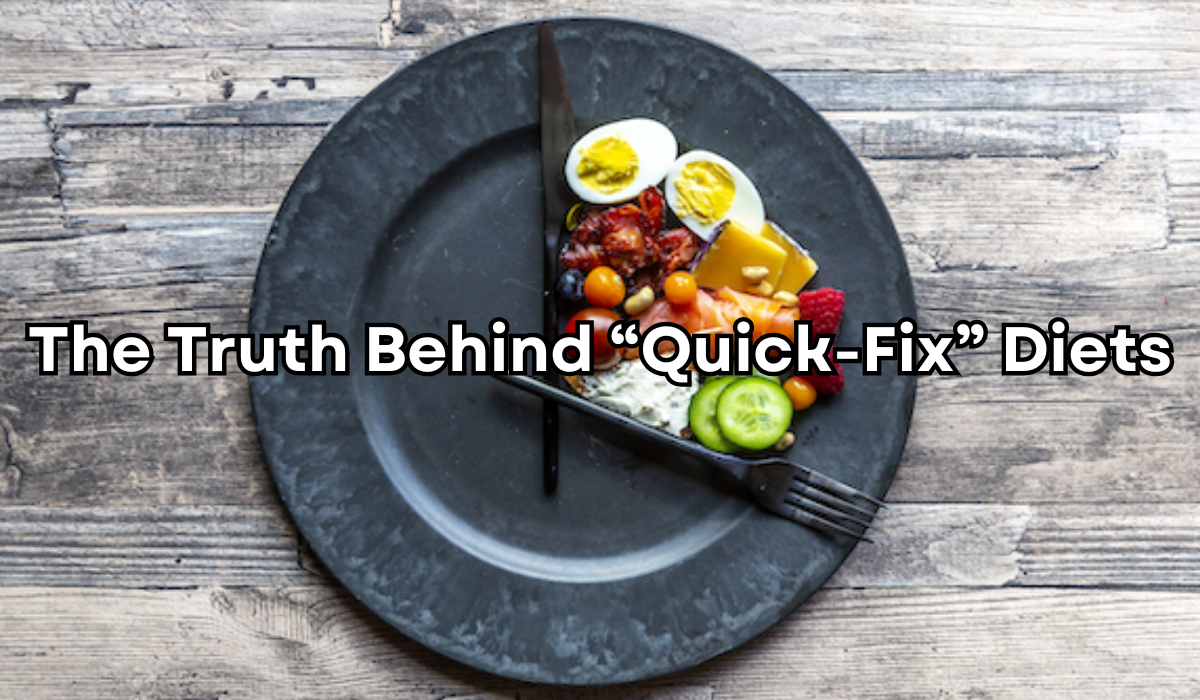In today’s world, where instant gratification is the norm, it’s no surprise that people seek quick solutions for weight loss and health. The internet is overflowing with fad diets promising rapid results—whether it’s keto, detox cleanses, extreme low-carb plans, or restrictive calorie diets. But have you ever wondered why these diets fail 95% of the time?
Because they are built on short-term deprivation, not long-term sustainability.
While quick-fix diets may show initial weight loss, they often damage metabolism, create nutritional deficiencies, and lead to more weight gain in the long run. Let’s uncover the truth behind these misleading diet trends and understand what truly works.
The Deceptive Science Behind Quick-Fix Diets
Most crash diets make you believe that rapid weight loss equals fat loss—but that’s not entirely true. The weight lost in the first few weeks of extreme dieting is primarily water weight and muscle mass, not fat.
Here’s what happens in a quick-fix diet:
Water Loss: The body burns through glycogen (stored carbs), which holds water. As glycogen depletes, water is flushed out, making it seem like you’re losing weight rapidly.
Muscle Breakdown: Severe calorie restriction forces the body to break down muscle for energy. Losing muscle slows down metabolism, making future weight loss harder.
Hormonal Disruption: Hunger hormones like ghrelin and leptin get thrown off balance, making you feel more hungry and prone to overeating after the diet ends.
Example: Have you ever noticed that after finishing a strict diet, you regain weight faster than you lost it? This is because your metabolism slows down, and your body holds on to fat as a survival mechanism.
The Dangerous Side Effects of Fad Diets
Most extreme diets create serious health risks, often worse than the original weight issue.
1. Nutrient Deficiencies That Weaken Your Body
Fad diets eliminate essential nutrients, causing long-term health damage.
Common nutrient deficiencies in restrictive diets:
- Iron Deficiency – Leads to fatigue, hair loss, and weakened immunity. Found in lentils, spinach, nuts, and seeds.
- Vitamin B12 Deficiency – Affects energy levels, nerve function, and metabolism. Found in dairy, fortified cereals, and plant-based supplements.
- Calcium & Vitamin D Deficiency – Causes weaker bones, joint pain, and increased injury risk. Found in ragi, sesame seeds, and fortified plant milks.
- Magnesium Deficiency – Leads to muscle cramps, poor sleep, and increased stress levels. Found in bananas, almonds, and whole grains.
- Protein Deficiency – Slows metabolism, weakens muscles, and increases cravings. Found in dal, chickpeas, and tofu.
Example: Many people who follow extreme low-calorie diets experience chronic fatigue, dizziness, and weakened immunity—signs of a starving body, not a healthy one.
2. Metabolic Slowdown & Weight Regain
When you eat too few calories, your body goes into survival mode, slowing metabolism and storing fat more efficiently. Over time, this makes losing weight harder and gaining weight easier.
- Your body burns fewer calories at rest.
- Your cravings increase, making you overeat later.
- Your hormones encourage fat storage.
Example: Studies show that people who follow extreme diets regain 50-70% of their lost weight within a year—and often gain back more than they originally lost.
3. Gut Health Disruptions
Most crash diets lack fiber, probiotics, and prebiotics, leading to:
- Bloating & Constipation – Due to lack of gut-friendly fiber.
- Acid Reflux & Acidity – From sudden meal changes and excessive protein.
- Weakened Immunity – As 70% of the immune system is linked to gut health.
Example: Many people who quit carbs suddenly experience digestive distress because fiber from grains and legumes plays a crucial role in gut health.
4. Mental & Emotional Struggles
Strict diets don’t just harm the body—they mess with the mind.
- Guilt & Anxiety Around Food – Making you fear eating normally again.
- Binge Eating Cycles – Extreme restriction leads to uncontrollable cravings.
- Increased Stress Hormones – Cortisol rises due to deprivation, leading to fat storage, especially around the belly.
Example: Research shows that 95% of people who follow restrictive diets develop binge-eating tendencies after they stop dieting.
What Actually Works for Sustainable Health?
Instead of relying on short-term fixes, focus on scientifically-backed, sustainable lifestyle changes that support metabolism, nutrient absorption, and long-term health.
1. Balanced, Nutrient-Dense Eating (Not Deprivation)
A diet rich in whole, unprocessed foods provides sustained energy and prevents deficiencies that slow down metabolism.
✔ Pair iron-rich foods with vitamin C:
- Iron is crucial for oxygen transport and energy metabolism, but non-heme iron (from plant sources) has lower absorption.
- Solution: Eat lentils, spinach, or chickpeas with vitamin C-rich foods like lemon, guava, or amla to increase iron absorption.
✔ Eat a fruit-based diet in the morning for better digestion & energy cycles:
- Fruits contain natural sugars, fiber, and phytonutrients that enhance mitochondrial function (energy production).
- Citrus fruits, bananas, and berries improve glucose metabolism, preventing energy crashes.
✔ Include magnesium-rich foods for energy production:
- Magnesium is a cofactor for ATP (the body’s energy currency).
- Found in almonds, pumpkin seeds, dark leafy greens, and whole grains—all essential for sustained energy.
✔ Support thyroid function with iodine & selenium:
- The thyroid controls metabolism and fat-burning efficiency.
- Include iodine-rich foods (seaweed, iodized salt) and selenium (brazil nuts, sunflower seeds, mushrooms) for optimal thyroid health.
2. Smart Portion Control & Meal Timing
Instead of extreme calorie restriction, smart meal timing and portion control optimize nutrient absorption and metabolism.
✔ Prioritize carbs in the morning & protein in the evening:
- Carbs provide quick energy and support cortisol function, which peaks in the morning.
- Protein at night aids muscle repair & overnight fat burning (stimulates growth hormone release).
✔ Practice circadian rhythm eating:
- Eating in sync with the body’s natural clock improves digestion & energy levels.
- Biggest meal: Midday when digestion is strongest.
- Lightest meal: Dinner to avoid metabolic slowdown during sleep.
✔ Use “food sequencing” to control glucose spikes:
- Start meals with fiber (salad, veggies) → then protein → then carbs.
- Benefit: Lowers blood sugar spikes, improves insulin response, and prevents fat storage.
3. Consistent Physical Activity to Preserve Metabolism
Quick-fix diets slow down metabolism—but movement speeds it up!
✔ Strength training boosts resting metabolic rate (RMR):
- More muscle = higher calorie burn even at rest.
- Include bodyweight exercises, resistance bands, or weightlifting 3–4 times a week.
✔ NEAT (Non-Exercise Activity Thermogenesis) matters more than gym workouts:
- Walking, stretching, fidgeting, standing—all increase daily calorie burn without exhaustion.
- Solution: Take the stairs, walk while on calls, stand every hour.
✔ Yoga & deep breathing improve metabolism & digestion:
- Poses like Surya Namaskar & Kapalbhati Pranayama stimulate the parasympathetic nervous system, improving gut function & fat metabolism.
4. Hydration & Sleep Optimization (The Forgotten Metabolism Boosters)
✔ Hydration & electrolyte balance prevent fatigue & sugar cravings:
- Even 1% dehydration slows metabolism and increases stress hormones.
- Solution: Drink coconut water, lemon water, or infused water to maintain electrolyte balance.
✔ Quality sleep regulates hunger hormones (ghrelin & leptin):
- Poor sleep increases cravings for high-calorie foods and slows fat-burning processes.
- Aim for 7-8 hours of sleep, and reduce blue light exposure before bed.
Nourish, Don’t Punish Your Body
Instead of starving your body with restrictive diets, fuel it wisely with nutrient-dense foods that support metabolism, hormone balance, and energy cycles.
Your body isn’t a machine that needs a “reset” with extreme dieting—it’s a dynamic system that thrives on consistency and nourishment.


